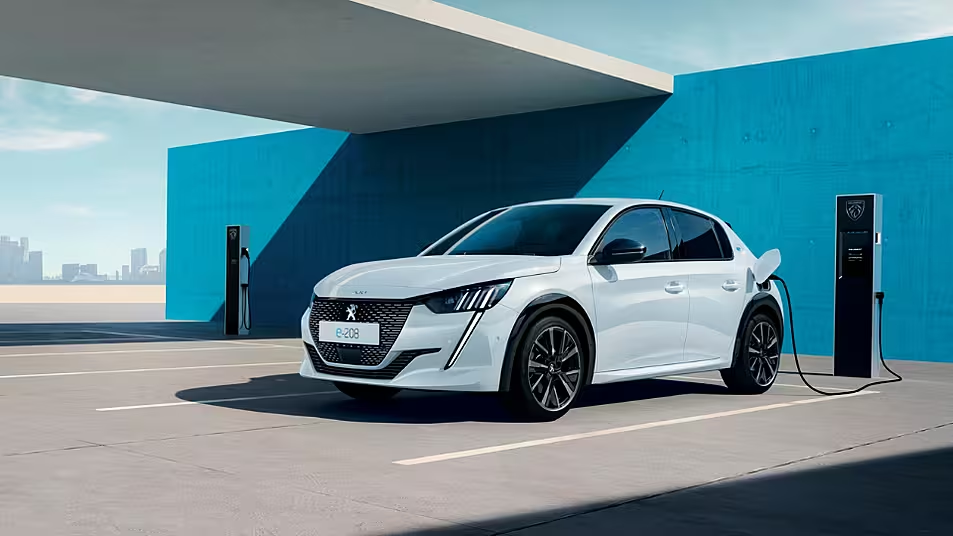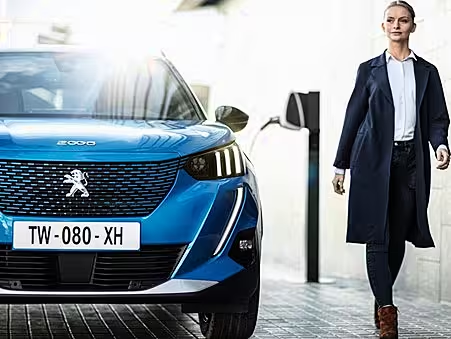With sales of electric and hybrid cars increasing each year, you may be thinking of switching. But moving from a petrol/diesel car to an electric or hybrid car can be a big change, so you need to be sure it is right for your current driving needs.
Here are some things to consider before making a decision.
What is the difference between an electric car and a hybrid?
There are actually four different types of electrified vehicle:
Battery Electric Vehicle (BEV) is run entirely on electricity. It has an electric motor instead of an internal combustion engine. It emits no tailpipe emissions and is charged by plugging into an electric charging system. Peugeot EV models include e-208 and e-2008 with the e-308 available from later this year.

A Plug-in Hybrid Vehicle (PHEV) has both a combustion engine and an electric battery. It can be driven by either power source. Like a BEV, the car is charged by plugging into an electric charging system. Peugeotmodels with PHEV include New 308, New 408, 508 and 3008.
The Hybrid Electric Vehicle (HEV) has a petrol/diesel engine alongside electric power to propel the wheels. The electrical power is generated when the car is braking or when it’s freewheeling. Electricity is never plugged into this car and is instead recharged by the fuel engine. Peugeot does not offer this option in its current model range.
A Mild Hybrid Electric Vehicle (MHEV) uses a smaller electric motor or generator that primarily assists the ICE (Internal Combustion Engine) during certain driving conditions, such as acceleration or cruising. The electric motor in an MHEV cannot propel the vehicle on its own, but it does have a positive impact on fuel consumption and emissions. Peugeot will soon be introducing this option on selected models in the range later this year.
Which is the best car for you?
This is down to what you need the car for. For example, if you’re looking to make daily commutes and shopping trips, the 100pc electric Peugeot e-208 is a compact car that has all the room you need for your comfort and that of your passengers. If you are on the lookout for a larger SUV version, the Peugeot e-2008 might be best suited.
Or perhaps, you’re looking for a family car, then the Peugeot 3008 Plug-in Hybrid is a sustainable way of travelling for your daily commutes or school runs with zero emissions, which also gives you an option of switching to the Petrol engine for longer trips.
Average driving
According to the most recent CSO statistics, on average people live within 15 kms of their place of work with the average distance driven by private car being 49 kms per day.
If you fit into this type of driving, an Electric Car or PHEV is perfect for you.
Once you have an electric Car Charger fitted to your home, range anxiety will no longer exist. Simply plug in your car when you get home, and it will always be charged and ready to go.
Currently, there are SEAI grants available of up to €600 for the supply and installation of a Home Electric Car Charger.
What type of property do you live in?

Although it is possible to charge an Electric Car with a standard three-pin plug socket, it is only recommended for occasional or emergency use. A home Electric Car Charger is a key part of ownership that eliminates any stress of range.
By installing an Electric Car Charger, you will always wake up to a full battery, ready for the day ahead.
However, this may not be possible for all homes, so please keep the following in mind if you are thinking of switching to an electric vehicle:
If you have on-street parking, this usually rules out getting an Electric Car Charger fitted due to distance, permissions and safety.
If you are renting the property you will need to get the landlord’s permission. Even if permission is granted, it will be difficult to bring the Electric Car Charger with you when you move homes.
If you live in an apartment, it may not be possible to fit an Electric Car Charger due to communal parking and distance from the building. However, the SEAI has recently started a consultation for EV charging points in apartments.
Cost
EVs currently have a more premium price than their petrol/diesel counterparts. However, the gap between owning an ICE (internal combustion engine) car or a hybrid/electric car is getting smaller. The Government are currently subsidising the cost of EVs with Grants, such as:
- €5,000* SEAI Electric Vehicle (EV) Purchase Scheme Grant
- Up to €5,000 VRT relief
- €600 EV domestic charger grant
- Reduced Benefit-in-Kind (BIK) for fully electric Company Cars
- Toll reductions of up to 50%
* The maximum grant for a private M1 (passenger car) will change to €3,500 from the 1st July 2023

The Government have signalled that these supports will be phased out eventually, so if you are considering an EV purchase now would be a good time to purchase.
Cost of ownership also needs to be considered when you are on the lookout for your next car. There are significant savings by owning an EV long term that will help offset the initial cost of purchase.
Saving on Tax: As road tax is based on the emissions produced by a vehicle, electric vehicles fall into the lowest tax band available. For example, 100% electric vehicles have a tax band of just €120 per year.
Savings on Maintenance: With no engine oils required and fewer moving parts, electric vehicles cost less to maintain than petrol or diesel versions.
Savings on fuel: Charging an electric vehicle costs less than fuelling a similar size petrol or diesel car. Choosing a home electricity plan with the correct tariff is the best way to ensure savings.
Do you have a second car?

As previously mentioned, the average driver in Ireland spends the majority of their journeys within 15kms of their home. But obviously, most people will occasionally want to get away for a holiday or a weekend break which will require more KMs to be driven. If you have a second car in your household this should be no issue.
If an EV is going to be your only car, you will need to look at charging points along your journey route and at your destination when going on a trip. You can use online services such as Zap-Map to help you find all the available free and fee-based power points near you and beyond.
Alternatively, you may consider a PHEV (Plug-in-electric-Vehicle) which is a Petrol / Diesel car that also has an electric power source. Unlike Mild Hybrids and Full Hybrids, you can charge PHEVs from an Electric Car Charger and get up to 60Km Range.
Whichever type is the right one for you, Peugeot will be able provide a solution. Over the next 2 years Peugeot will release 5 new Full EVS: E-308, E-308 SW (first European electric estate), E-408, E-3008 and E-5008.
New HYBRID Technology will also be rolled out throughout the Peugeot range, starting this year with the MHEV 48v being introduced on selected models in the range.
What’s more, by the end of 2023 every model in the Peugeot line-up will be Electrified, by 2025 Peugeot will have a 100% Electric Option and by 2030 100% of Peugeots sold in Europe will be 100% Electric.
For more information on the Peugeot Electric Range, contact your local Dealer or visit peugeot.ie








